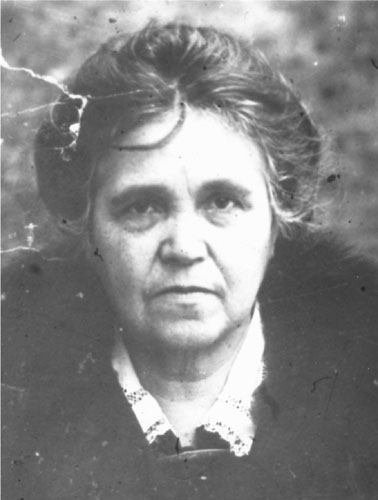Starytska-Cherniakhivska, Liudmyla
Starytska-Cherniakhivska, Liudmyla [Старицька-Черняхівська, Людмила; Staryc'ka-Černjaxivs'ka, Ljudmyla], b 29 August 1868 in Kyiv, d 1941 on the way to exile in Kazakhstan. (Photo: Liudmyla Starytska-Cherniakhivska.) Writer, literary critic, and community activist; daughter of Mykhailo Starytsky and sister of Maria Starytska and Oksana Steshenko; wife of Oleksander Cherniakhivsky. Starytska-Cherniakhivska was a friend of Lesia Ukrainka, and together with other Ukrainian writers they took part in the activities of the literary group Pleiada (1888–93). Starytska-Cherniakhivska began publishing her work in 1887 in the Lviv almanac Pershyi vinok, and then published in Zoria (Lviv), thejournal Pravda, Literaturno-naukovyi vistnyk, and Zhytie i slovo. Her poetry was published in Skladka and other almanacs, in the anthology of recitations Rozvaha (Divertissement), and in the poetry anthologies Akordy (Chords) and Ukraïns’ka muza (The Ukrainian Muse). Starytska-Cherniakhivska's poetic works are similar to Lesia Ukrainka's in style and motif. She also wrote prose and drama, translated, and wrote literary criticism. Her most noteworthy dramatic works include Het'man Petro Doroshenko (1908), Kryla (Wings, 1913), Ostannii snip (The Last Sheaf, 1917), Rozbiinyk Karmeliuk (The Robber Karmeliuk, 1926), and Ivan Mazepa (1927). She also wrote many literary critical essays and memoirs, in particular about Mykhailo Kotsiubynsky (1913), Liubov Yanovska (1909), and Hanna Barvinok (1911).
One of Starytska-Cherniakhivska's best memoirs is ‘Khvylyny zhyttia Lesi Ukraïnky’ (Moments from the Life of Lesia Ukrainka, 1913). Noteworthy are her essays on the history of theater, ‘Dvadtsiat'-p'iat' rokiv ukraïns'koho teatru’ (‘25 Years of Ukrainian Theater,’ Ukraïna, 1907 nos 10–12). In 1917 Starytska-Cherniakhivska was elected to the Central Rada. In 1919 she was cofounder and deputy president of the National Council of Ukrainian Women in Kamianets-Podilskyi. In 1930 she was arrested in connection with the Trial of the Union for the Liberation of Ukraine and sentenced to five years of imprisonment, but after a few months she was released and exiled to Yuzivka instead. In 1936 Starytska-Cherniakhivska returned to Kyiv. She was rearrested by the NKVD together with her sister, Oksana Steshenko, on 4 June 1941.
Petro Odarchenko
[This article originally appeared in the Encyclopedia of Ukraine, vol. 5 (1993).]
.jpg)
.jpg)
.jpg)
